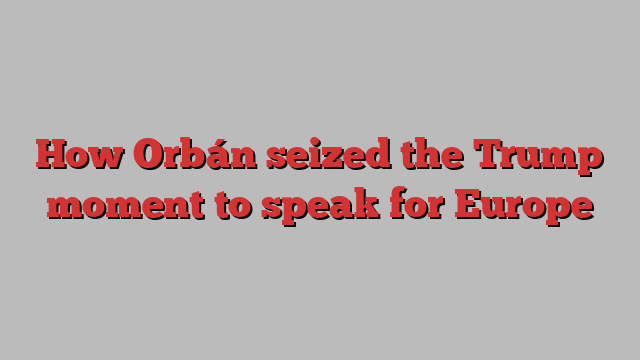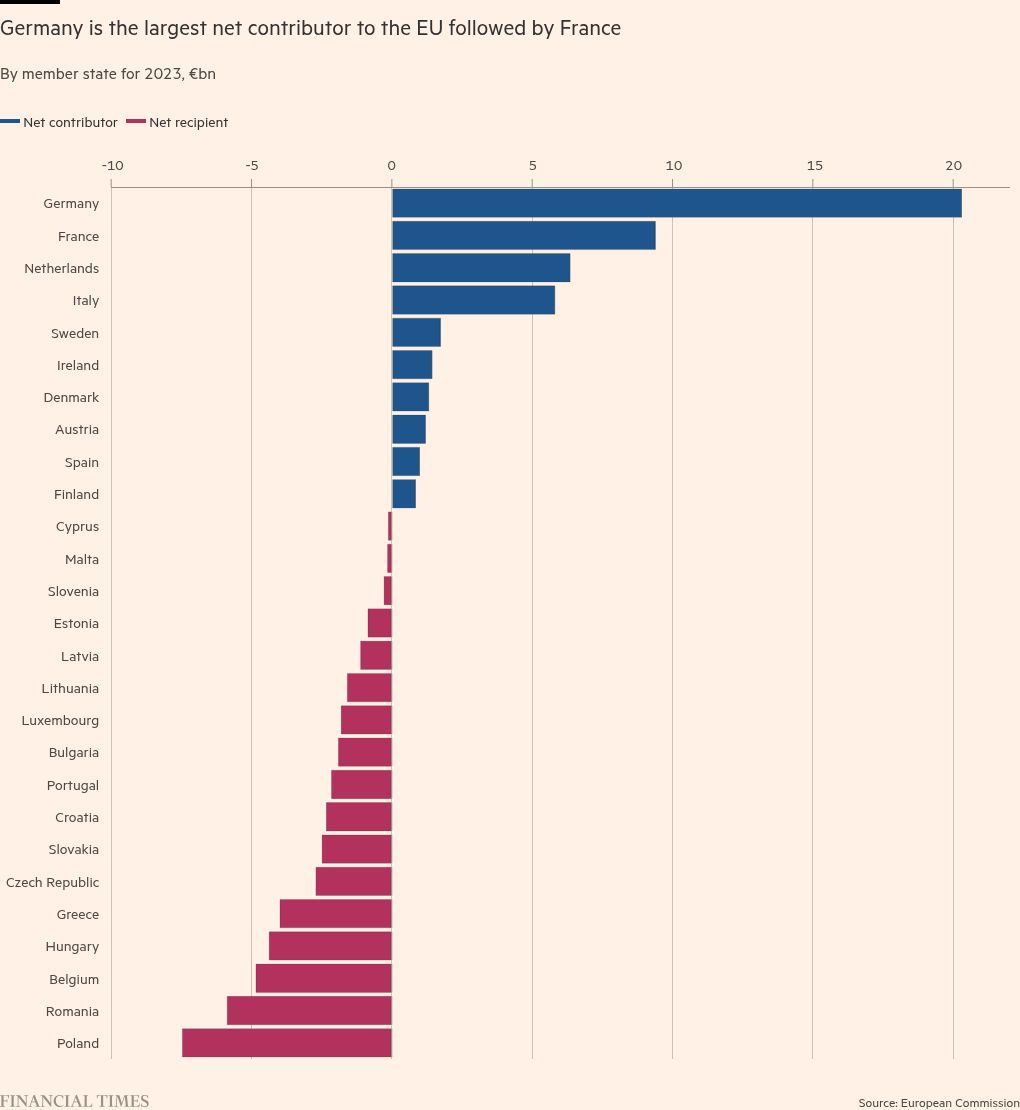
This article is an on-site version of our Europe Express newsletter. Premium subscribers can sign up here to get the newsletter delivered every weekday and Saturday morning. Standard subscribers can upgrade to Premium here, or explore all FT newsletters
Good morning. Today I report from Viktor Orbán’s victory lap in Budapest, and our Rome bureau chief brings us news of Italy’s renewed attempt to ship migrants to Albania.
Have a great weekend. We will be back on Tuesday after Armistice day.
Orbán’s glee
Viktor Orbán couldn’t have planned it better if he had tried. Thirty-six hours after his ally Donald Trump was declared the winner of the US election, he strode into a press conference as the self-appointed voice of Europe, delivering the conclusions of a 42-leader summit he hosted in his capital.
Context: Hungarian Prime Minister Orbán, the EU’s most Eurosceptic leader, hosted the European Political Community summit yesterday — a perk linked to his holding of the rotating six-month EU council presidency. The EPC is formed of EU states and European countries such as Norway, Turkey and the UK.
Orbán peacocked in the Budapest sunshine as he welcomed his fellow European leaders one by one, and then watched them all line up to stress the need to work with his buddy Trump (a man who has threatened not to protect them, make their imports more expensive and cut off aid to war-torn Ukraine.)
“History is accelerated. With the American elections, a chapter has closed. The world is going to change, and change in a quicker way than before,” Orbán proclaimed at the post-summit press conference.
“Obviously, it is a great chance for Hungary to be in a close partnership and alliance with the USA,” Orbán said. “We will seize these opportunities.”
Orbán has been isolated in the EU for calling for immediate peace in Ukraine regardless of Russia occupying parts of the country. Yesterday, he said that was no longer the case.
“One thing is evident today, which is that those who want peace are increasingly numerous,” he said. “With the US election, the camp of those who wants peace has increased manifold.”
Ukrainian President Volodymyr Zelenskyy, however, rejected that and related demands to make concessions to Russia for potential peace.
“It is obvious that the change of ideas in Europe is going on,” Orbán concluded, adding that Europeans needed to talk to the US and Russia to make sure they were not “cut out” of the continent’s new security architecture.
In an added bonus for Orbán, the sense of EU crisis was heightened by the collapse of the German government shortly before the summit began, meaning chancellor Olaf Scholz was unable to participate.
Many diplomats sighed at the irony: Orbán has long been the EU’s black sheep; Trump, the EU’s anathema. But now, in a geopolitical reality reshaped by the US electorate, this was their moment.
Edi Rama, Albania’s prime minister and the next EPC host, drily noted it was “special to see all of Europe gathered together in the barn of its black sheep, Viktor”.
Chart du jour: Fiscal faultlines

The question of how to fund EU competitiveness and mitigate the impact of Trump’s presidency is bringing back old bitter divisions between the bloc’s rich and poor.
Shipped off
Italian Prime Minister Giorgia Meloni’s plan to send EU-bound asylum seekers to Albania faces its next major test, as a new group of people reaches Albanian shores today, writes Amy Kazmin.
Context: Determined to curb irregular migration, Meloni wants to hold asylum seekers from countries that Rome deems safe in Italian-run centres in Albania. The aim is to ease pressure on Italy’s overcrowded asylum system and deter more people from arriving.
But Meloni’s plan — which is being closely watched by other EU countries seeking to curb immigration — has faced legal obstacles, after a court last month ordered a first group of migrants to be brought to Italy.
A judge ruled that the 12 Bangladeshi and Egyptian nationals brought to Albania had “the right to be taken to Italy” because of “the impossibility of recognising the states of origins of the detained persons as ‘safe countries’”.
Meloni hit back angrily, saying that it was not the judges’ competence “to determine which countries are safe and which are not”.
Her cabinet has approved a new law formally declaring 19 countries “safe”, in the hope it will be more legally binding than a previous list.
The new group of migrants, eight men from Bangladesh and Egypt, are due to arrive in Albania today and will be heard by an immigration judge — who will speak to them from Rome via video link — within days.
The court’s reaction to their arrival will be crucial for the success of the scheme that Meloni has made the linchpin of her migration policy.
Brussels, London and other European capitals keen to copy her plans will be watching closely.
What to watch today
-
EU leaders meet for informal summit in Budapest.
-
Greek foreign minister George Gerapetritis hosts his Turkish counterpart Hakan Fidan in Athens.
Now read these
-
Brave new world: The postwar multilateral order has been showing signs of strain for years. Donald Trump threatens to render it fully irrelevant.
-
The last word: After years of infighting, German Chancellor Olaf Scholz has brought down his governing coalition. What took him so long?
-
Putin’s call offer: Vladimir Putin said he was willing to speak with Donald Trump as he congratulated him on his US election win. The Russian president said he had normal dealings with Trump in the past, and would be willing to even contact him first.
Recommended newsletters for you
Trade Secrets — A must-read on the changing face of international trade and globalisation. Sign up here
Swamp Notes — Expert insight on the intersection of money and power in US politics. Sign up here
Are you enjoying Europe Express? Sign up here to have it delivered straight to your inbox every workday at 7am CET and on Saturdays at noon CET. Do tell us what you think, we love to hear from you: [email protected]. Keep up with the latest European stories @FT Europe